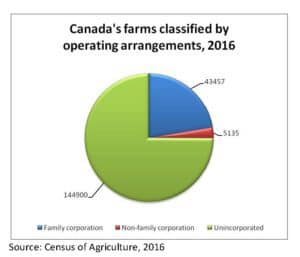The federal government’s proposal to change tax measures for private corporations is very much in the news. Unfortunately, the debate has become very heated with a lot of questionable information circulating. We have seen reporters saying these changes will make it so there is no advantage to incorporating a farm on one hand, and on the other, suggesting that they will ruin the family farm. Such statements invoke emotional reactions instead of clear-headed analysis.
The following information is meant to provide useful information about the proposed changes and their larger context so that NFU members, other farmers and the general public can better assess the potential impact of the proposed changes to tax measures for private corporations, and if they wish, to provide helpful input to the federal government’s public consultation on the tax system.
First, what is the Consultation about?
The public consultation is onproposed policy responses to close loopholes and bring greater fairness to the tax system. Specifically, the proposals are meant to address:
- Income sprinkling (when the corporation pays dividends to family members who do not contribute to the business for the sole purpose of avoiding taxes)
- Passive investment (a wealthy person uses their private corporation to make investments in mutual fund, stock market, bonds, etc. instead investing under their own name, allowing them to pay less tax and increase their private fortune faster)
- Converting income into capital gains (setting up a bunch of shell companies and using the corporation’s income to buy and sell shares in these companies so that the money can be counted as capital gains from these transactions instead of income from their corporation, and thus taxed at a lower rate.)
The Government is also asking Canadian for their views and ideas on whether, and if so how, it would be possible for theIncome Tax Actto help with genuine intergenerational business transfers while still protecting the fairness of the tax system.
Second, what is the Consultation NOT about?
The proposed changes:
- do not affect the existing provision for a lifetime capital gains exemption of $1 million when passing a farm to the next generation.
- do not apply to unincorporated farms.
- are not about taxing an incorporated farm’s total revenue, they only affect the net income (what is left after paying all expenses, including salaries, inputs, repairs, etc.)
- would not affect taxation of farm profits that are invested in equipment, land or other assets that help the farm become more productive
- do not stop a farmer from paying dividends to family members, but the dividend amounts must reasonably reflect the person’s contribution to the farm
- do not raise the very low 10.5 % tax rate on the first $500,000 of net income that currently applies to small businesses that are set up as private corporations
Here is the Finance Ministry’s website with background information for the consultation process – https://www.fin.gc.ca/activty/consult/tppc-pfsp-eng.asp.
The Deadline for comments is October 2, 2017
The NFU is in favor of social justice and this includes fair returns to farmers so that farmers can make a living and young people will see farming as a viable and rewarding career choice.
Keeping or eliminating tax loopholes would not address the real problems that farmers face in terms of income. Several NFU members who are incorporated and have large farms have asked their accountants for an opinion on the proposed tax change would have no impact on their farms and have been informed there would be no effect.
 Only 25% of Canada’s farms are incorporated, so 75% are not affected by the proposed changes. There are 1.8 million private corporations in Canada, and of these, only 43,457 are incorporated family farms. Thus farms make up only 2.4% of all companies potentially affected if the loopholes are closed. In addition, only a small number of the incorporated farms are in a position to take advantage of these loopholes. Realized net farm income (what you have left after expenses are paid) has stayed at a low level for decades even though gross farm income (the revenue you have before paying expenses) has gone up.
Only 25% of Canada’s farms are incorporated, so 75% are not affected by the proposed changes. There are 1.8 million private corporations in Canada, and of these, only 43,457 are incorporated family farms. Thus farms make up only 2.4% of all companies potentially affected if the loopholes are closed. In addition, only a small number of the incorporated farms are in a position to take advantage of these loopholes. Realized net farm income (what you have left after expenses are paid) has stayed at a low level for decades even though gross farm income (the revenue you have before paying expenses) has gone up.
Farmers are the weak link in the agriculture value chain – we are price takers when we buy inputs and price takers when we sell our product. Farm businesses that eliminate the middle man end up doing all the work of the middle man (processing, packaging, storage distributing) so their unavoidable costs are often in the form of more labour and infrastructure, while competing with the retailers on price.
 The long-standing problem of low net farm income means that the vast majority of farmers simply do not have the kind of money needed to actually use the loopholes in question. Total farm debt outstanding is over $90 billion, so most farmers are not saving – they are trying to keep up with their loan payments. And, if a farm is prosperous enough to clear well over $200,000/year after all expenses are paid, it should not be a hardship to pay taxes at the same rate that someone would who earns that much money in a salaried position.
The long-standing problem of low net farm income means that the vast majority of farmers simply do not have the kind of money needed to actually use the loopholes in question. Total farm debt outstanding is over $90 billion, so most farmers are not saving – they are trying to keep up with their loan payments. And, if a farm is prosperous enough to clear well over $200,000/year after all expenses are paid, it should not be a hardship to pay taxes at the same rate that someone would who earns that much money in a salaried position.
Farmers lack income due to the imbalance of power in the market place. Each individual farmer is small in comparison to the corporations we have to deal with or compete with, whether it is a multinational grain company, a retail conglomerate, a railway company or a big seed company. This power imbalance cannot be corrected by having wealthy individuals avoid paying taxes. The NFU works to build up farmer power – through more fair agriculture policy and by supporting the institutions that make it possible for farmers to work together in the marketplace. Many of these policies and institutions are becoming weaker as a result of trade deals and the lobbying power of big agribusiness. We also know that big businesses have many ways of avoiding taxes (such as paying their CEOs stock options and structuring their company so that most of their profits go into off-shore tax shelters instead of being taxable in Canada) and there should be measures to make sure they pay their fair share of taxes too.
Taxes can seem unfair when we can’t tangibly see how they are used. But they are how some of the most important things get done in this country, including provide better health care, increasing rural infrastructure, paying for agricultural research, funding farm support programs such as AgriInvest, AgriStability and Crop Insurance. Tax loopholes that benefit the super rich are not acceptable, but neither is bad policy. The proposed tax changes are estimated to collect about $250 million in additional tax dollars from the wealthiest of 1.8 million private corporations. This money would become available for public purposes.
We hope this information will help farmers weed through the rhetoric and fight for the next generation of farmers.
